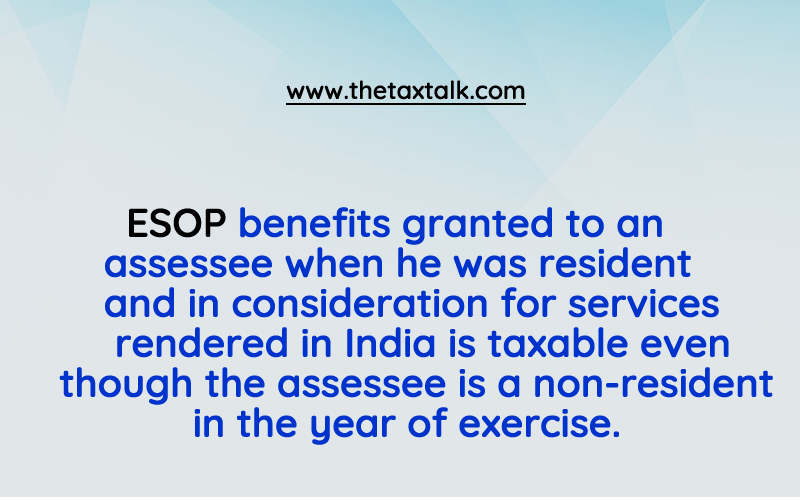![]()
ESOP benefits granted to an assessee when he was resident and in consideration for services rendered in India is taxable even though the assessee is a non-resident in the year of exercise.
Unnikrishnan V S vs. ITO (ITAT Mumbai)
ITA Nos. 1200 and 1201/Mum/2018
Short Overview:
Article 15 of the India-UAE DTAA permits taxation of ESOP benefit, which is included in the scope of the expression “other similar remuneration” appearing immediately after the words “salaries and wages”, in the jurisdiction in which the related employment is exercised.
Thus, an assessee who gets ESOP benefits in respect of his service in U.A.E. and he exercises these options at a later point of time, say after returning to India and ceasing to be a non-resident, will still have the treaty protection of that income under article 15(1).
Conversely, when the assessee gets the ESOP benefit on account of rendering services in India, he cannot have the benefit of article 15 in respect of the said income.
We find that so far as the ESOP benefit is concerned, while the income has arisen to the assessee in the current year, admittedly the related rights were granted to the assessee in 2007 and in consideration for the services which were rendered by the assessee prior to the rights being granted- which were rendered in India all along.
The character of income may be inchoate at that stage but certainly what is being sought to be taxed now, on account of the specific provision under section 17(2)(vi), is a fruit of services rendered much earlier and the benefit, which has now become a taxable income, accrued to the assessee in 2007.
All that section 17(2)(vi) decides is the timing of an income, but it does not dilute or negate the fact that the benefit, in which is being sought to be taxed, had arisen much earlier i.e., at the point of time when the ESOP rights were granted.
On these facts, in our considered view, the income, even if it was inchoate at the point of time when the options were granted, has accrued and has arisen in India.
The assessee is a non- resident in the current assessment year, but quite clearly, the benefit, in respect of which the income is bring sought to be taxed now, had arisen at an earlier point of time in India.
Viewed thus, the income in respect of ESOP grant benefit accrued and had arisen at the point of time when the ESOP rights were granted, even though the taxability in respect of the same, on account of the specific legal provisions under section 17(2)(vi), has arisen in the present in this year.
Conclusions :
ESOP benefits granted to an assessee when he was resident and in consideration for services rendered in India is taxable even though the assessee is a non-resident in the year of exercise.
- 17(2)(vi) decides the timing of the income to be the year of exercise of the ESOPs but does not dilute or negate the fact that the benefit had arisen at the point of time when the ESOP rights were granted.

